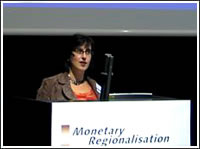Monetary Regionalisation: Local currency systems as catalysts for endogenous regional development September 28-29, Weimar, Germany

During a glorious week of warm sunny weather, over 300 people gathered in the former East German city of Weimar to learn and discuss about local currency systems. This two-day event brought together international experts and social scientists from many different disciplines to discuss the potential - and experience - of local money systems to contribute to economic and social development.
The conference combined theoretical contributions from economics, sociology, geography and regional planning, with empirical cases and evaluations. Recent and historical case studies from a variety of international countries (including the UK, Hungary, Argentina, Brazil and Indonesia) served to illustrate the discussions with practical examples [You can download some papers in Documents section].
The event itself was a wonderful focus for international activists and academics to meet and exchange ideas, and the organisers did a fantastic job of bringing so many people together to discuss these ideas, and the break times and evenings were rich with socialising, making friends and contacts, sampling the local Weimarer beer, and struggling with unfamiliar languages!
The conference posed many of the questions which the Social Money workshop is asking, namely:
- Which cooperative, administrative, political, economic and civil structures are being used in the practical implementation of local currency systems?
- Which long-term and sustainable effects do local currency systems have towards the economic and social development of a region - are they catalysts for endogenous sustainable development?
- What factors determine the "success" or "failure" of local currency systems?
However, because the whole conference consisted of lectures ’from the front’, it was a missed opportunity in terms of providing a discussion space and workshops to actually answer these questions. A more participative and interactive format might have enabled the many people in the audience with real experience and insight, to share their knowledge and expertise.
The event was followed by a two-day RegioGeld Congress, bringing together activists of the new German local money systems, and of course there was much overlap between the events. A real highlight of the conference for me was the chance to buy a pack of RegioGeld Quartett (Happy Families) playing cards, featuring 32 local and regional money systems of the German-speaking countries! I understand that future editions will feature European CCs, Asian CCs, and so on, and they are a wonderful way to introduce people to the idea and variety of CCs existing around the world - which was also the message of this conference.
Gill Seyfang


